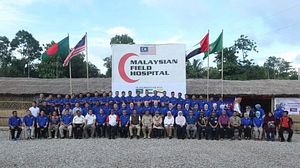Earlier this month, Malaysia’s new defense minister paid his first visit to a new hospital that the Southeast Asian state had constructed in Bangladesh in response to the Rohingya crisis. The trip spotlighted one of the contributions Malaysia has made on the issue amid questions about how the country will approach foreign policy issues with the election of a new government that came to power in May.
As I have noted before in these pages, since the Rohingya crisis first broke out, Muslim-majority Malaysia has been among the countries in the Asia-Pacific playing an active role on the issue, both on its own as well as in concert with other countries and groupings including within ASEAN.
One of the manifestations of Malaysia’s assistance to the Rohingya was the construction of a field hospital in Bangladesh. The set up and running of the hospital, named Medan Malaysia Hospital (HMM), was initially conducted by various Malaysian government agencies including the health, foreign, and defense ministries, and commenced operations in December 2017.
Although the government of Najib Razak had previously indicated that the hospital would continue to operate until at least the end of 2018, the election of a new government that came to power following elections in May had raised questions about several of Malaysia’s previous foreign policy commitments, with some changes expected in certain areas.
Though the exact direction of things is far from clear, this month Malaysia’s hospital was in the spotlight again when the country’s new defense minister, Mohamad Sabu, paid a visit to Bangladesh. Sabu’s trip, which occurred on July 12, included a visit to the hospital as well as to the Rohingya refugee camp at Cox’s Bazar, was organized by the defense ministry as well as with volunteer group Amal Relief Malaysia and other non-governmental organizations.
During the trip, he assessed the operation of the hospital as well as the supplies and aid necessary for the protection of the Rohingya at the refugee camp at Cox’s Bazaar. According to MINDEF, he also met with Bangladeshi officials, including Prime Minister Sheikh Hasina Wazed.
The visit also saw other related developments. For instance, Brunei’s High Commissioner to Bangladesh handed over some humanitarian aid for the operation of the hospital, which was billed as part of the sultanate’s contribution to alleviating the plight of the Rohingyas and as a testament to the close bilateral ties between it and Malaysia.
Few additional specifics have been publicly unveiled by the Malaysian government thus far on the future outlook for the hospital. But as evidenced from the recent visit, at least for now, it continues to be an important symbol of Malaysia’s contribution to addressing the Rohingya crisis which the new government in power shares.

































